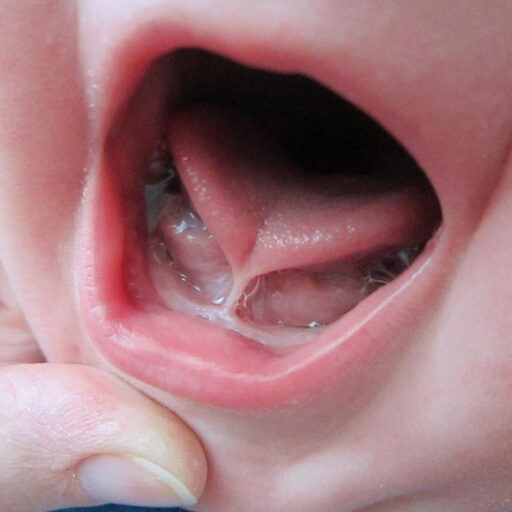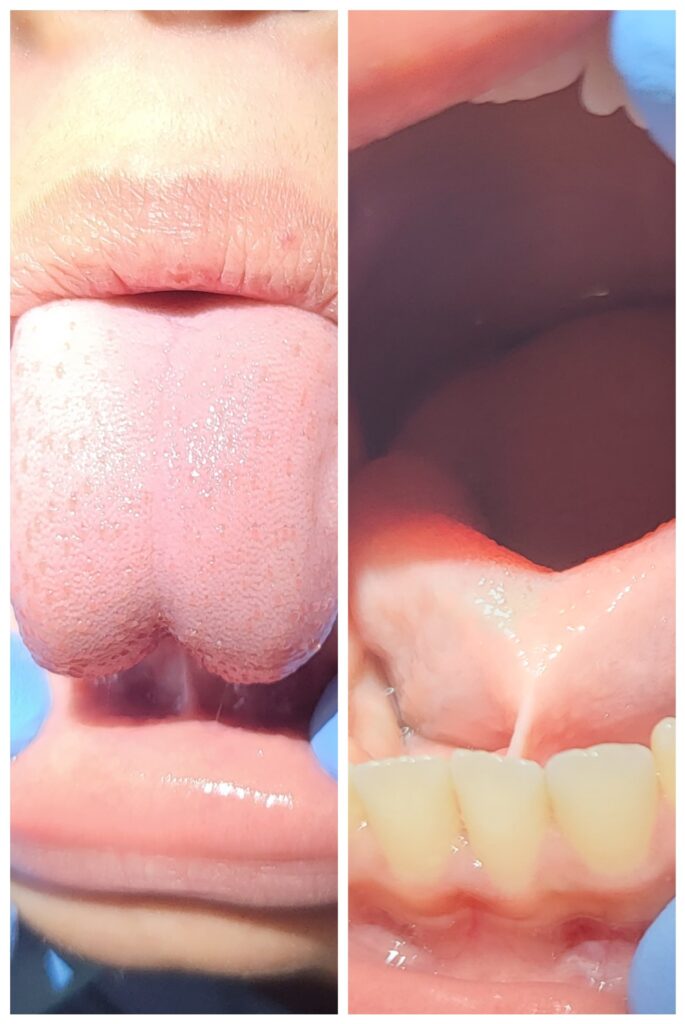Tongue Tie in Infants

What is tongue-tie?
Tongue Tie is when the membrane under the tongue (the lingual frenulum) restricts the movement of the tongue. All babies are born with some of this tissue, but for a small percentage (ranges 4-11%) of newborns, it is so tight that they cannot move their tongues freely. This can affect their ability to breastfeed and can lead to poor latch. Tongue-tie can also affect the affect the way a child eats, speaks and swallows.
Tongue-tie types
Tongue-ties can be described as anterior (where the frenulum extends towards the front of the tongue) or posterior (towards the back of the mouth). Tongue-ties might also be described using a percentage or a number (type I, II, III and IV). This percentage or number describes how far along the underside of the tongue the frenulum comes. So 100%, or type I, would indicate that the frenulum comes all the way to the front of the tongue.
A posterior tongue-tie, which may be described as a 10% tongue-tie, can restrict tongue function just as much as an anterior one. That means these anatomical descriptions of how the tongue looks don’t always relate to how severely a tongue-tie will affect tongue function and your baby’s feeding.
Warning signs of tonge-tie in infants
When a newborn develops a tongue-tie, it might prevent them from obtaining adequate nutrition and create developmental problems. Your baby might develop airway problems that require myofunctional surgical procedures to fix if treatment is neglected. Between 4% and 11% of newborns and infants may develop tongue-tie. Up to 25% of babies may have tissue behind the tongue, although not every infant requires surgery or therapy to fix the condition.
Breastfeeding-related discomfort
It is unmistakably a sign that something is wrong when breastfeeding causes pain. Due to their difficulty moving their tongues properly, babies with tongue-ties generally have trouble latching. Ineffective latching and feeding can cause engorged breasts and broken nipples, which can cause mastitis.
Audible clicking during feeding
A baby with a tongue tie won’t be able to seal around the breast well, which will cause clicking sounds as the suction keeps breaking. Sometimes a click is normal and doesn’t mean anything is wrong, but if it hurts or the baby isn’t gaining weight as expected, it might mean the baby has tongue-tie.
Irregular weight gain
Your child’s failure to breastfeed effectively might be due to movement problems brought on by tongue-ties. Additionally, a baby with tongue tie may struggle to gain weight if the mother is unable to breastfeed adequately.
Irritability
An infant that is gassy and irritable most often has a tongue knot. This is because a child with a tongue tie finds it difficult to create a tight seal over the breast; as a result, the child inhales too much air when eating, which results in gassines.
Repeated mastitis
Mastitis is a breast infection or breast inflammation that reduces a mother’s capacity to produce milk. Recurrent mastitis is a problem when a newborn has tongue-tie because the baby can’t adequately feed themselves. Due to milk stagnation and increased pressure in the duct and lobe system of the breast, this might appear in mastitis.
High, narrow palate
When the mouth is closed, a tongue that is in normal function rests on the roof of the mouth, which helps the palate take on the proper shape. When the tongue is tied, it cannot rest on the palate and instead have a high, and narrow position.
Recessed chin
Newborns with tongue-tie frequently have a sunken chin, although some infants will have this feature due to heredity even if they do not have tongue-tie.
It is necessary to do a comprehensive examination to identify whether your infant has a tongue-tie since for many parents, being able to breastfeed is an integral aspect of motherhood. If you believe your baby may have this problem, please contact our dental office right away.

Problems a tongue-tie does for infants
If a baby has a tongue-tie, they may not be able to extend or lift their tongue or move it from side to side. Some will be able to lift the sides, but not the tip (v-shaped tongue). Some will be unable to lift the posterior of the tongue (bowl-shaped tongue). In babies where they frenulum extends all the way to the tip, the tongue may look heart-shaped. Tongue-tie can affect both breastfeeding and bottle-feeding. For some babies, the effects will be quite mild. For others, tongue-tie can make feeding extremely challenging or even impossible.
In order to breastfeed, a baby needs to be able to open their mouth wide, extend their tongue over their bottom lip and scoop the breast into their mouth. Then the tongue needs to massage the breast in a wave-like motion to remove milk from the breast.
If your baby has a tongue-tie and you are breastfeeding, you might experience one or more of the following in your baby:
- difficulty in latching
- difficulty in maintaining a latch, with your baby frequently coming off the breast or slipping back to the nipple
- a shallow latch
- clamping down on the breast
- clicking noises while feeding
- unsettled behaviour during feeds
- frequent or long feeds
- poor weight gain or excessive early weight loss
- colic/wind/hiccups/reflux.
If you are breastfeeding your baby and they have tongue-tie, you might find your nipples are sore and appear squashed after a feed, often appearing ridged, lipstick-shaped, flattened or blanched. If your baby isn’t draining your breasts adequately, this can lead to engorgement, blocked ducts and mastitis. It can also have a negative effect on your milk supply. Feeds which are long or frequent can be very tiring.
If you are bottle-feeding your baby, you might notice one or more of the following – your baby:
- is very slow to take a bottle
- chomps on the teat
- needs to be fed very often in order to get enough milk
- dribbles a lot during feeds
- tends to push the bottle teat out
- gags on feeds even when you slow the feed down
- can only manage a teat that has a very slow flow.
If a tongue-tie or lip-tie is left alone, it does not stretch out or go away, but it can cause lifelong issues for babies to adults. Many times, the issues are not attributed to a tongue-tie, and parents, healthcare providers, and others don’t realize that the issues are actually rooted in a restricted tongue.
Tongue-tie, or having a restricted tongue, is an underappreciated cause of many babies having crying episodes (which may or may not qualify as colic). Colic or excessive crying is common in babies, but it is not normal. A posterior tongue-tie can cause all the symptoms of a more obvious version, including painful nursing, slow weight gain (sometimes), gassiness, fussiness, spitting up, reflux, and excessive crying or colic.
Many oral restrictions are diagnosed in babies due to difficulties with breastfeeding. At this stage of development the main issue is the baby’s inability to properly suction, suck and swallow due to an oral restriction. This can lead to weight loss, low weight gain and a failure to thrive diagnosis for the baby, as well as clogged milk ducts, mastitis, infections, and nipple pain for the nursing mother.
The ideal time to have a release procedure is between 6-14 days after your baby is born. When an oral restriction is diagnosed and treated at this stage, you can prevent many other complications and conditions that can arise in a child with an untreated oral tie issue.
Mothers are generally asked to breastfeed their baby as soon as the procedure is performed and to offer comfort, as soon as possible.
Mostly, babies show immediate improvements in breastfeeding after this surgery. Tongue tie and lip tie laser surgery is a relatively quick, simple, and painless procedure. Your child can nurse as soon as he or she desires after the surgery. However, it generally takes 30 to 45 minutes for the effects of any numbing medication to wear off.
When feeding from a bottle, a baby predominantly uses the middle part of their tongue, so it is not as important for the tip of the tongue to be mobile. If the tongue tie is affecting feeding, the following signs may be present:
- Excessive drooling
- Poor weight gain
- Taking a long time to feed
- Excessive gassiness
Your baby won’t necessarily have all the signs mentioned if they are having problems with breastfeeding or bottle feeding due to a tongue tie or lip tie. But, if your baby is experiencing any of the signs above, or you feel concerned that your baby may have a tongue tie or a lip tie, you may want to discuss it with your doctor, pediatrician or breastfeeding specialist.
Parents often expect that feeding will improve immediately after a tongue-tie division. Feeding can be more difficult for the first day or two after a tongue-tie division because it takes time for your baby to adjust to their new, freely-moving tongue.

